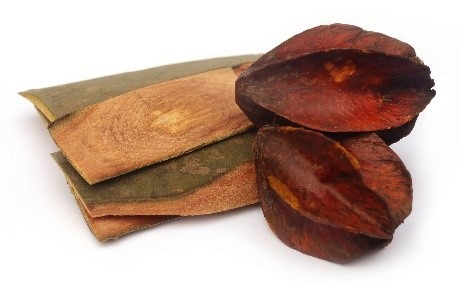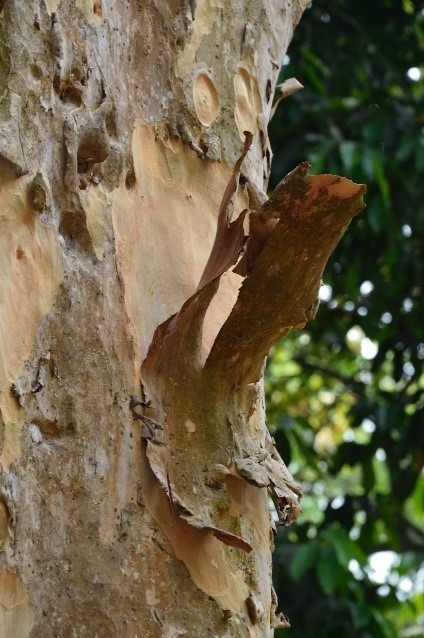ARJUNA
Arjun treeTerminalia arjuna
Arjuna is a deciduous evergreen tree that can reach heights up to 20-25 meters. The red inner bark is highly demarked for its therapeutic properties especially as a cardiac tonic from generations. Arjuna is native to the wet, marshy, sub-Himalayan regions of India and Sri Lanka. Arjuna is astringent in taste; cool in nature and kapha-pitta-ghna i.e. it pacifies kapha and pitta doshas.


The bark of Arjuna is white, thus its name ‘Arjuna’ means bright, white or shining in Sanskrit. Acharya Charak has placed it under udarda-prashaman (urticarial-relieving) medicinal group of herbs.
Health Benefits from Arjun:
It is easy to understand why Arjuna has been the Agryah (foremost) Ayurvedic rejuvenative for the heart and how this tradition has inspired scientific research confirming its historical value. Beyond its cardio-protective properties, Arjuna’s astringent, bitter and pungent qualities make it useful in other areas such as wounds, fractures and bleeding disorders.
- Helps maintain healthy lipid profile in the body by lowering the low density cholesterol
- Good for maintaining a healthy heart
- Helps to lower glucose levels and improves glucose tolerance
- Helps in accelerating wound healing due to its astringent effect that draws the tissues together
- Astringent effect helps in reducing various bleeding disorders
- Has anti-microbial, anti-viral, anti-inflammatory and analgesic properties
- Inhibitor of bacteria causing acne
Arjun for Heart Health:
Major compounds ‘Triterpenoids’ present in Arjuna are actively effective in many cardiac disorders like angina, hypertension and increased cholesterol levels. The bark of Arjuna helps to improve the pumping action of the heart & strengthen heart muscles. It prevents oxidative stress and damage to heart muscles. Arjuna helps in increasing coronary artery flow & protects it from damage. So, it is effective herb for people who have poor cardiovascular circulation.
Arjuna for Bone Health:
Arjuna possess bone regeneration properties. It plays an important part in improving bone formation process. It regulates calcium & phosphorus metabolism in the body. Traditionally, also it is used for strengthening bones, supporting healthy bone density and healing bone fractures.
How to Use Arjun:
- In various cardiac disorders, ghee processed with Arjun
- Its cold decoction (hima) along with honey is beneficial in various bleeding problems.
- In various skin disorders, you can incorporate the Arjuna bark for bathing, drinking, local application, etc.
- Milk processed with Arjuna bark powder (Ksheerapaka), is beneficial for improving rate of healing in fractures.
- In urticaria, apply Arjuna juice, decoction or paste with honey.
Arjuna offerings from Sandu:
Sandu Arjunarishta: It is a hydro-alcoholic formulation, consisting mainly of Arjuna and used as a cardio-tonic.
Sandu Ashwagandharishta: It is a hydro-alcoholic formulation for your complete health. It is an excellent rejuvenative tonic.
Debix: It is a comprehensive tablet for treating diabetes and preventing its complications with cardio-protective properties.
Shishuvin: is a proprietary Ayurvedic formulation that acts as a potent and complete health tonic for your healthy development of your children.
Elegance Oil: is a proprietary Ayurvedic formula for beautiful skin. It helps in nourishment and development of infant, especially in premature and underweight new born; it helps in development, nourishment and toning of muscles and ligaments. It improves circulation, metabolism and immunity.
Sandu Balant Kadha No.2: is an Ayurvedic formulation to relieve physical & mental fatigue, regulate post-partum bleeding, protect against post-delivery infections and pacify elevated vata dosha after labour or childbirth.
Citations:
- Gupta, Simmy & Bishnoi, Jyoti & Kumar, Naveen & Kumar, Harish & Correspondence, Jyoti & Bishnoi,. (2018). Terminalia arjuna (Roxb.) Wight &Arn.: Competent source of bioactive components in functional food and drugs. Innovation Journal. 7.
- Krithiga, G., et al. “Study on osteopotential activity of Terminalia arjuna bark extract incorporated bone substitute.” Bulletin of Materials Science 37.6 (2014): 1331-1338.
- Chaudhari, Minakshi, and Sushma Mengi. “Evaluation of phytoconstituents of Terminalia arjuna for wound healing activity in rats.” Phytotherapy Research: An International Journal Devoted to Pharmacological and Toxicological Evaluation of Natural Product Derivatives 20.9 (2006): 799-805.


